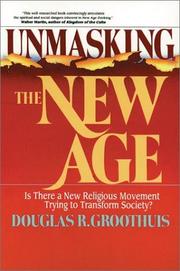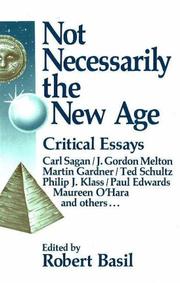| Listing 1 - 10 of 680 | << page >> |
Sort by
|

ISBN: 0877845689 Year: 1987 Publisher: Downers Grove (Ill.) : InterVarsity press,
Abstract | Keywords | Export | Availability | Bookmark
 Loading...
Loading...Choose an application
- Reference Manager
- EndNote
- RefWorks (Direct export to RefWorks)
Book
Year: 2010 Publisher: To be supplied : Project Gutenberg,
Abstract | Keywords | Export | Availability | Bookmark
 Loading...
Loading...Choose an application
- Reference Manager
- EndNote
- RefWorks (Direct export to RefWorks)
Nonfiction. --- History. --- New Age.
Book
Year: 2011 Publisher: München : Verlag Otto Sagner,
Abstract | Keywords | Export | Availability | Bookmark
 Loading...
Loading...Choose an application
- Reference Manager
- EndNote
- RefWorks (Direct export to RefWorks)
Occult and esoteric ideas became deeply embedded in Russian culture long before the Bolshevik Revolution. After the Revolution, occult ideas were manifested in literature, the humanities and the sciences as well. Although the Soviet government discouraged and eventually prohibited metaphysical speculation, that same government used the Occult for its own purposes and even funded research on it. In Stalin's time, occultism disappeared from public view, but it revived clandestinely in the post-Stalin Thaw and became a truly popular phenomenon in post-Soviet Russia. From cosmism to shamanism, from space exploration to Kabbalah, from neo-paganism to science fiction, the field is wide. Everyone interested in the occult and esoteric will appreciate this book, because it documents their continued importance in Russia and raises new issues for research and discussion. www.new-age-of-russia.com.
Book
ISBN: 2871210918 Year: 2001 Publisher: Paris, Bruxelles : La Longue Vue,
Abstract | Keywords | Export | Availability | Bookmark
 Loading...
Loading...Choose an application
- Reference Manager
- EndNote
- RefWorks (Direct export to RefWorks)
New Age --- Spiritualité
Book
Year: 2010 Publisher: To be supplied : Project Gutenberg,
Abstract | Keywords | Export | Availability | Bookmark
 Loading...
Loading...Choose an application
- Reference Manager
- EndNote
- RefWorks (Direct export to RefWorks)
Nonfiction. --- New Age.

ISBN: 0879754907 Year: 1988 Publisher: Buffalo Prometheus
Abstract | Keywords | Export | Availability | Bookmark
 Loading...
Loading...Choose an application
- Reference Manager
- EndNote
- RefWorks (Direct export to RefWorks)
Book
ISBN: 0810394022 Year: 1991 Publisher: New York Visible Ink Press
Abstract | Keywords | Export | Availability | Bookmark
 Loading...
Loading...Choose an application
- Reference Manager
- EndNote
- RefWorks (Direct export to RefWorks)
Book
ISBN: 3846748749 Year: 2009 Publisher: Paderborn : Wilhelm Fink Verlag,
Abstract | Keywords | Export | Availability | Bookmark
 Loading...
Loading...Choose an application
- Reference Manager
- EndNote
- RefWorks (Direct export to RefWorks)
Moderne Esoterik und Okkultismus sind 'schwankende Gestalten'. Esoterische Praktiken haben sich in den letzten Jahrzehnten nicht nur in Deutschland ausgebreitet, so dass von einer 'Okkultwelle' gesprochen wurde. Sie sind heute in das Bewusstsein vieler Menschen eingedrungen, häufig ohne dass ihnen die esoterische Qualität ihrer Vorstellungen und Praktiken bewusst ist. Der Band stellt die verbreitesten Praktiken und Vorstellungen vor und erörtert sie kritisch. In der öffentlichen und wissenschaftlichen Diskussion finden sich drei Positionen zur modernen Esoterik: Erstens wird Esoterik als Glaubenssystem oder Religion angesehen, dessen Lehren aus der gesamten Religionsgeschichte zusammengestellt sind. Zweites wird Esoterik als 'höhere Wissenschaft' ausgegeben. Drittens wird Esoterik als Synthese von Wissen und Glauben angeboten. Von dieser wird erwartet, dass sie die spätestens seit Beginn der Neuzeit eingetretene Trennung von Glauben und Wissen, Religion und Wissenschaft, die für viele Probleme unserer Gesellschaft verantwortlich sei, überwunden werden könnte. Esoterik tritt deshalb als Heilsversprechen auf, das Interesse an ihr signalisiert eine Enttäuschung an der Religion, Kunst und Wissenschaft, so dass viele Menschen sich den 'Geheimwissenschaften' zuwenden, um in diesen Lehren und Praktiken ihr Interesse am Außergewöhnlichen, ihr Bedürfnis nach Orientierung und Entscheidungshilfe und neue und leicht erreichbare Möglichkeiten zur Unterhaltung zu suchen.
Book
ISBN: 9781781795040 9781781796344 Year: 2018 Publisher: Bristol Equinox Publishing
Abstract | Keywords | Export | Availability | Bookmark
 Loading...
Loading...Choose an application
- Reference Manager
- EndNote
- RefWorks (Direct export to RefWorks)
Just as we speak of "dead" languages, we say that religions "die out." Yet sometimes, people try to revive them, today more than ever. 'New Antiquities' addresses this phenomenon through critical examination of how individuals and groups appeal to, reconceptualize, and reinvent the religious world of the ancient Mediterranean as they attempt to legitimize developments in contemporary religious culture and associated activity. 0Drawing from the disciplines of religious studies, archaeology, history, philology, and anthropology, this book explores a diversity of cultic and geographic milieus, ranging from Goddess Spirituality to Neo-Gnosticism, from rural Oregon to the former Yugoslavia. As a survey of the reception of ancient religious works, figures, and ideas in later twentieth-century and contemporary alternative religious practice, New Antiquities will interest classicists, Egyptologists, and historians of religion of many stripes, particularly those focused on modern Theosophy, Gnosticism, Neopaganism, New Religious Movements, Magick, and Occulture.
Book
Year: 2011 Publisher: München : Verlag Otto Sagner,
Abstract | Keywords | Export | Availability | Bookmark
 Loading...
Loading...Choose an application
- Reference Manager
- EndNote
- RefWorks (Direct export to RefWorks)
Occult and esoteric ideas became deeply embedded in Russian culture long before the Bolshevik Revolution. After the Revolution, occult ideas were manifested in literature, the humanities and the sciences as well. Although the Soviet government discouraged and eventually prohibited metaphysical speculation, that same government used the Occult for its own purposes and even funded research on it. In Stalin's time, occultism disappeared from public view, but it revived clandestinely in the post-Stalin Thaw and became a truly popular phenomenon in post-Soviet Russia. From cosmism to shamanism, from space exploration to Kabbalah, from neo-paganism to science fiction, the field is wide. Everyone interested in the occult and esoteric will appreciate this book, because it documents their continued importance in Russia and raises new issues for research and discussion. www.new-age-of-russia.com.
| Listing 1 - 10 of 680 | << page >> |
Sort by
|

 Search
Search Feedback
Feedback About UniCat
About UniCat  Help
Help News
News